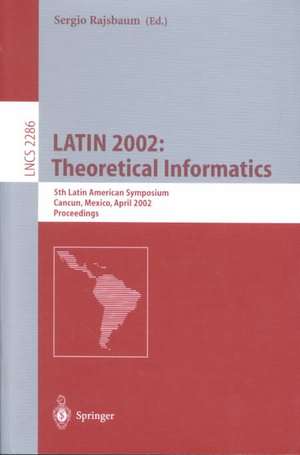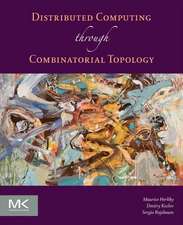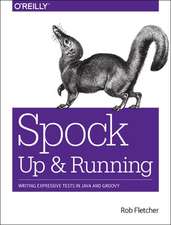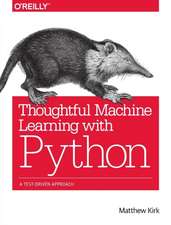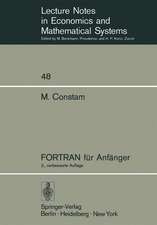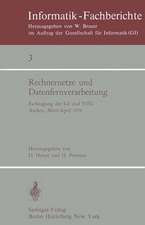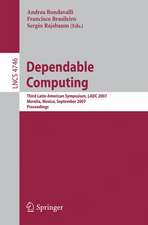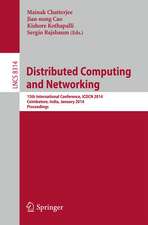LATIN 2002: Theoretical Informatics: 5th Latin American Symposium, Cancun, Mexico, April 3-6, 2002, Proceedings: Lecture Notes in Computer Science, cartea 2286
Editat de Sergio Rajsbaumen Limba Engleză Paperback – 20 mar 2002
The 44 revised full papers presented together with a tutorial and 7 abstracts of invited contributions were carefully reviewed and selected from a total of 104 submissions. The papers presented are devoted to a broad range of topics from theoretical computer science and mathematical foundations, with a certain focus on algorithmics and computations related to discrete structures.
Din seria Lecture Notes in Computer Science
- 20%
 Preț: 1061.55 lei
Preț: 1061.55 lei - 20%
 Preț: 307.71 lei
Preț: 307.71 lei - 20%
 Preț: 438.69 lei
Preț: 438.69 lei - 20%
 Preț: 645.28 lei
Preț: 645.28 lei -
 Preț: 410.88 lei
Preț: 410.88 lei - 15%
 Preț: 580.46 lei
Preț: 580.46 lei - 17%
 Preț: 427.22 lei
Preț: 427.22 lei - 20%
 Preț: 596.46 lei
Preț: 596.46 lei -
 Preț: 449.57 lei
Preț: 449.57 lei - 20%
 Preț: 353.50 lei
Preț: 353.50 lei - 20%
 Preț: 1414.79 lei
Preț: 1414.79 lei - 20%
 Preț: 309.90 lei
Preț: 309.90 lei - 20%
 Preț: 583.40 lei
Preț: 583.40 lei - 20%
 Preț: 1075.26 lei
Preț: 1075.26 lei - 20%
 Preț: 310.26 lei
Preț: 310.26 lei - 20%
 Preț: 655.02 lei
Preț: 655.02 lei - 20%
 Preț: 580.93 lei
Preț: 580.93 lei - 20%
 Preț: 340.32 lei
Preț: 340.32 lei - 18%
 Preț: 938.83 lei
Preț: 938.83 lei - 20%
 Preț: 591.51 lei
Preț: 591.51 lei - 15%
 Preț: 438.59 lei
Preț: 438.59 lei - 20%
 Preț: 337.00 lei
Preț: 337.00 lei -
 Preț: 389.48 lei
Preț: 389.48 lei - 20%
 Preț: 607.39 lei
Preț: 607.39 lei - 20%
 Preț: 1024.44 lei
Preț: 1024.44 lei - 20%
 Preț: 579.30 lei
Preț: 579.30 lei - 20%
 Preț: 763.23 lei
Preț: 763.23 lei - 20%
 Preț: 453.32 lei
Preț: 453.32 lei - 20%
 Preț: 575.48 lei
Preț: 575.48 lei - 20%
 Preț: 585.88 lei
Preț: 585.88 lei - 20%
 Preț: 825.93 lei
Preț: 825.93 lei - 20%
 Preț: 763.23 lei
Preț: 763.23 lei - 17%
 Preț: 360.19 lei
Preț: 360.19 lei - 20%
 Preț: 1183.14 lei
Preț: 1183.14 lei - 20%
 Preț: 340.32 lei
Preț: 340.32 lei - 20%
 Preț: 504.57 lei
Preț: 504.57 lei - 20%
 Preț: 369.12 lei
Preț: 369.12 lei - 20%
 Preț: 583.40 lei
Preț: 583.40 lei - 20%
 Preț: 343.62 lei
Preț: 343.62 lei - 20%
 Preț: 350.21 lei
Preț: 350.21 lei - 20%
 Preț: 764.89 lei
Preț: 764.89 lei - 20%
 Preț: 583.40 lei
Preț: 583.40 lei - 20%
 Preț: 649.49 lei
Preț: 649.49 lei - 20%
 Preț: 341.95 lei
Preț: 341.95 lei - 20%
 Preț: 238.01 lei
Preț: 238.01 lei - 20%
 Preț: 538.29 lei
Preț: 538.29 lei
Preț: 662.95 lei
Preț vechi: 828.69 lei
-20% Nou
Puncte Express: 994
Preț estimativ în valută:
126.85€ • 132.80$ • 104.96£
126.85€ • 132.80$ • 104.96£
Carte tipărită la comandă
Livrare economică 05-19 aprilie
Preluare comenzi: 021 569.72.76
Specificații
ISBN-13: 9783540434009
ISBN-10: 3540434003
Pagini: 652
Ilustrații: XIV, 638 p.
Dimensiuni: 155 x 235 x 34 mm
Greutate: 0.9 kg
Ediția:2002
Editura: Springer Berlin, Heidelberg
Colecția Springer
Seria Lecture Notes in Computer Science
Locul publicării:Berlin, Heidelberg, Germany
ISBN-10: 3540434003
Pagini: 652
Ilustrații: XIV, 638 p.
Dimensiuni: 155 x 235 x 34 mm
Greutate: 0.9 kg
Ediția:2002
Editura: Springer Berlin, Heidelberg
Colecția Springer
Seria Lecture Notes in Computer Science
Locul publicării:Berlin, Heidelberg, Germany
Public țintă
ResearchCuprins
Invited Talks and Tutorials.- Phase Transitions in Computer Science.- The Internet, the Web, and Algorithms.- Erd?s Magic.- Open Problems in Computational Geometry.- Quantum Algorithms.- Testing and Checking of Finite State Systems.- From Algorithms to Cryptography Tutorial.- Dihomotopy as a Tool in State Space Analysis Tutorial.- Regular Contributions.- Algorithms for Local Alignment with Length Constraints*.- An Algorithm That Builds a Set of Strings Given Its Overlap Graph.- Conversion between Two Multiplicatively Dependent Linear Numeration Systems.- Star Height of Reversible Languages and Universal Automata.- Weakly Iterated Block Products of Finite Monoids.- The Hidden Number Problem in Extension Fields and Its Applications.- The Generalized Weil Pairing and the Discrete Logarithm Problem on Elliptic Curves.- Random Partitions with Non Negative rth Differences.- Beta-Expansions for Cubic Pisot Numbers.- Facility Location Constrained to a Polygonal Domain.- A Deterministic Polynomial Time Algorithm for Heilbronn’s Problem in Dimension Three.- A Metric Index for Approximate String Matching.- On Maximal Suffices and Constant-Space Linear-Time Versions of KMP Algorithm.- On the Power of BFS to Determine a Graphs Diameter.- k-pseudosnakes in Large Grids.- L(2, 1)-Coloring Matrogenic Graphs.- Pipeline Transportation of Petroleum Products with No Due Dates.- Ancestor Problems on Pure Pointer Machines.- Searching in Random Partially Ordered Sets.- Packing Arrays.- Generalized Shannon Code Minimizes the Maximal Redundancy.- An Improved Algorithm for Sequence Comparison with Block Reversals.- Pattern Matching and Membership for Hierarchical Message Sequence Charts.- Improved Exact Algorithms for Max-Sat.- Characterising Strong Normalisation for Explicit Substitutions.-Parameters in Pure Type Systems.- Category, Measure, Inductive Inference: A Triality Theorem and Its Applications.- Verification of Embedded Reactive Fiffo Systems.- Electronic Jury Voting Protocols.- Square Roots Modulo p.- Finding Most Sustainable Paths in Networks with Time-Dependent Edge Reliabilities.- Signals for Cellular Automata in Dimension 2 or Higher.- Holographic Trees.- On the Spanning Ratio of Gabriel Graphs and ?-skeletons.- In-Place Planar Convex Hull Algorithms.- The Level Ancestor Problem Simplified.- Flow Metrics.- On Logical Descriptions of Regular Languages.- Computing Boolean Functions from Multiple Faulty Copies of Input Bits.- Inapproximability Results on Stable Marriage Problems.- Tight Bounds for Online Class-Constrained Packing.- On-line Algorithms for Edge-Disjoint Paths in Trees of Rings.- Massive Quasi-Clique Detection.- Improved Tree Decomposition Based Algorithms for Domination-like Problems.
Caracteristici
Includes supplementary material: sn.pub/extras
